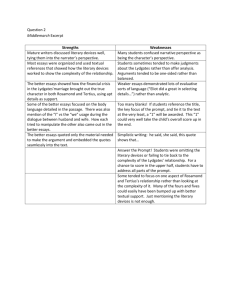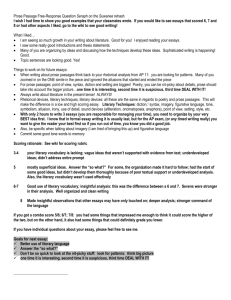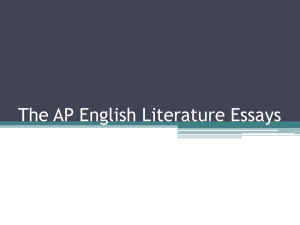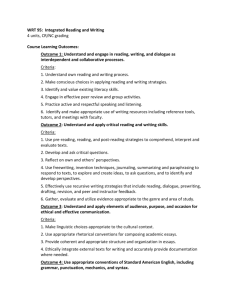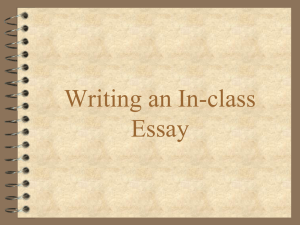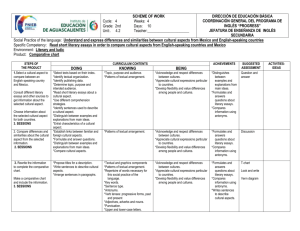File 2011cu gold falllcourse 1020 doc. 4
advertisement
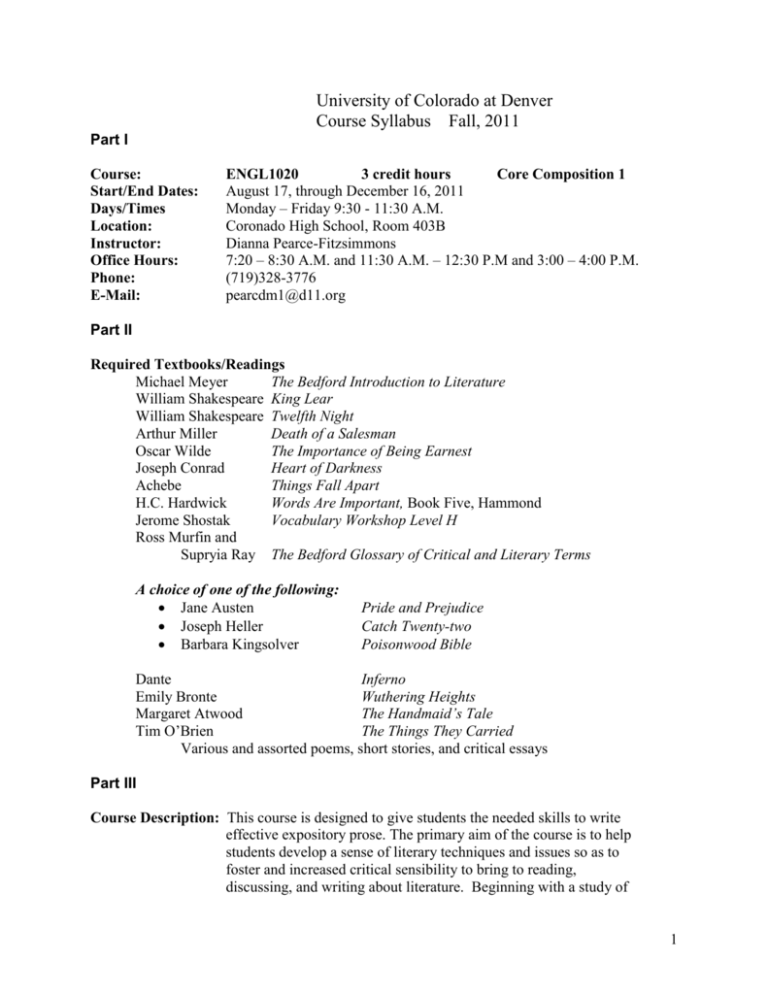
University of Colorado at Denver Course Syllabus Fall, 2011 Part I Course: Start/End Dates: Days/Times Location: Instructor: Office Hours: Phone: E-Mail: ENGL1020 3 credit hours Core Composition 1 August 17, through December 16, 2011 Monday – Friday 9:30 - 11:30 A.M. Coronado High School, Room 403B Dianna Pearce-Fitzsimmons 7:20 – 8:30 A.M. and 11:30 A.M. – 12:30 P.M and 3:00 – 4:00 P.M. (719)328-3776 pearcdm1@d11.org Part II Required Textbooks/Readings Michael Meyer The Bedford Introduction to Literature William Shakespeare King Lear William Shakespeare Twelfth Night Arthur Miller Death of a Salesman Oscar Wilde The Importance of Being Earnest Joseph Conrad Heart of Darkness Achebe Things Fall Apart H.C. Hardwick Words Are Important, Book Five, Hammond Jerome Shostak Vocabulary Workshop Level H Ross Murfin and Supryia Ray The Bedford Glossary of Critical and Literary Terms A choice of one of the following: Jane Austen Joseph Heller Barbara Kingsolver Pride and Prejudice Catch Twenty-two Poisonwood Bible Dante Inferno Emily Bronte Wuthering Heights Margaret Atwood The Handmaid’s Tale Tim O’Brien The Things They Carried Various and assorted poems, short stories, and critical essays Part III Course Description: This course is designed to give students the needed skills to write effective expository prose. The primary aim of the course is to help students develop a sense of literary techniques and issues so as to foster and increased critical sensibility to bring to reading, discussing, and writing about literature. Beginning with a study of 1 the short story, clarification of the purpose of critical terminology and exploration of the basic analytical skills necessary to write critical essay will be examined. We will focus on poetry and drama to understand the different issues imposed by different genres. Through close textual reading and frequent writings, students will develop their skill in composing well-structured, logically argued and precisely supported, analytical essays. Students are expected to carefully study assigned works in preparation for the culminating writing. Writing assignments will focus both on stylistic analysis and on thematic interpretations of the works as a whole. Thoughtful “reductions” should be created and classroom discussions participated in. As the culmination of these efforts, students will be expected to demonstrate proficiency in producing clearly structured, interpretive essays, rich in both textual evidence and argument. Course Objectives: After completing this course, students will be able to create “reductions” (one-sheet compilations of important stylistic and thematic elements to assist students in arriving at interpretations and a thesis produce effective thesis statement employ strong, interpretive topic sentences as a structural aid for organization use precise textual evidence, committed to memory and recalled connect textual analysis to meaning of the work “as a whole” explain, discuss, and argue the justness of points to persuade the reader of the thesis combine all of the above to write persuasive, analytical essays evaluate effective writing through the study and practice “grading” of sample essays and peer evaluations of our current work Writings: Students will write approximately twenty essays, to include analysis of a literary work as it reflects ideas: the course texts will be applied to thematic questions. Students will be required to write responses that include specific textual references and developed interpretations (ten essays total) close reading of a prose passage: excerpts from studied and unstudied works given to students for stylistic analysis analysis of a literary work from different critical perspectives: historical, biographical, psychological, archetypal, feminist, Marxist, etc. analysis of language techniques as they convey meaning in poems comparison-contrast essay: two poems of similar themes comparison-contrast essay: discussing directorial decisions, and their interpretive implications, in one of the film versions of a test ironic voice essay: a short piece critiquing a social problem in which the ironic voice is employed theme analyzing tone optional personal essay: one or more college application essays are submitted, reviewed by the instructor, and revised if appropriate 2 Oxford English Dictionary essay: an optional essay analyzing obsolete word meanings which enrich the reading of Twelfth Night Note: A number of the writing assignments are repeated many times, with new textual prompts, to provide sufficient practice. It is also important to note that many of the essays are written in class and are in response to previously unseen texts. Students practice all the techniques of effective writing, as well as being quick on their feet. By the end of the course, students are well practiced in pulling their thoughts together and writing sensitively and coherently in a forty-minute period. Tests: Students will be asked to take fifty-question tests on each work. These exams are short answer and focus on both close reading and on textual analysis. The final for the course is a two-hour exam during which three essays are written (two in response to previously unseen prompts, one poetry and one prose, and one in which a course text is applied to a writing prompt.) Fifteen lessons from the advanced level, book 5 of Words Are Important and Sadlier Oxford Vocabulary Workshop, Level H, will be covered. In addition, forty-five literary terms will be studied. (The other semester course, ENGL 1400 will cover the other Words Are Important lessons and the remaining forty-five literary terms.) Fill-in tests are given to determine student mastery as well as writings incorporating terms and examples of the terms are required. Discussions: Discussions can be held prior to, or after, the testing and writing on a text. This depends on the accessibility of the text. Sometimes directed reading questions are simply supplied; sometimes the discussion occurs during the reading process. Students are expected to participate actively. Vocabulary: Students will complete fifteen lessons of college-level vocabulary lessons as well as learn forty-five literary terms. Understanding of specific terms is particularly important to understanding the definition at issue, and emphasizing the important of correct usage. Part IV Evaluation/Grading Procedures - No late work will be accepted for a grade. Grading will be on a percentage system: Assignment Percentage Short papers, written exercises, research paper 40% Tests and quizzes 30% Vocabulary /misc. 20% Attendance/participation 10% The following scale will be used: 98-100 = A+ 94-97 = A 90-93 = A- 88-89 = B+ 84-87 = B 80-83 = B- 78-79 = C+ 74-77 = C 70-73 = C- 68-69 = D+ 64-67 = D 60-63 = D- 59 and below = F 3
